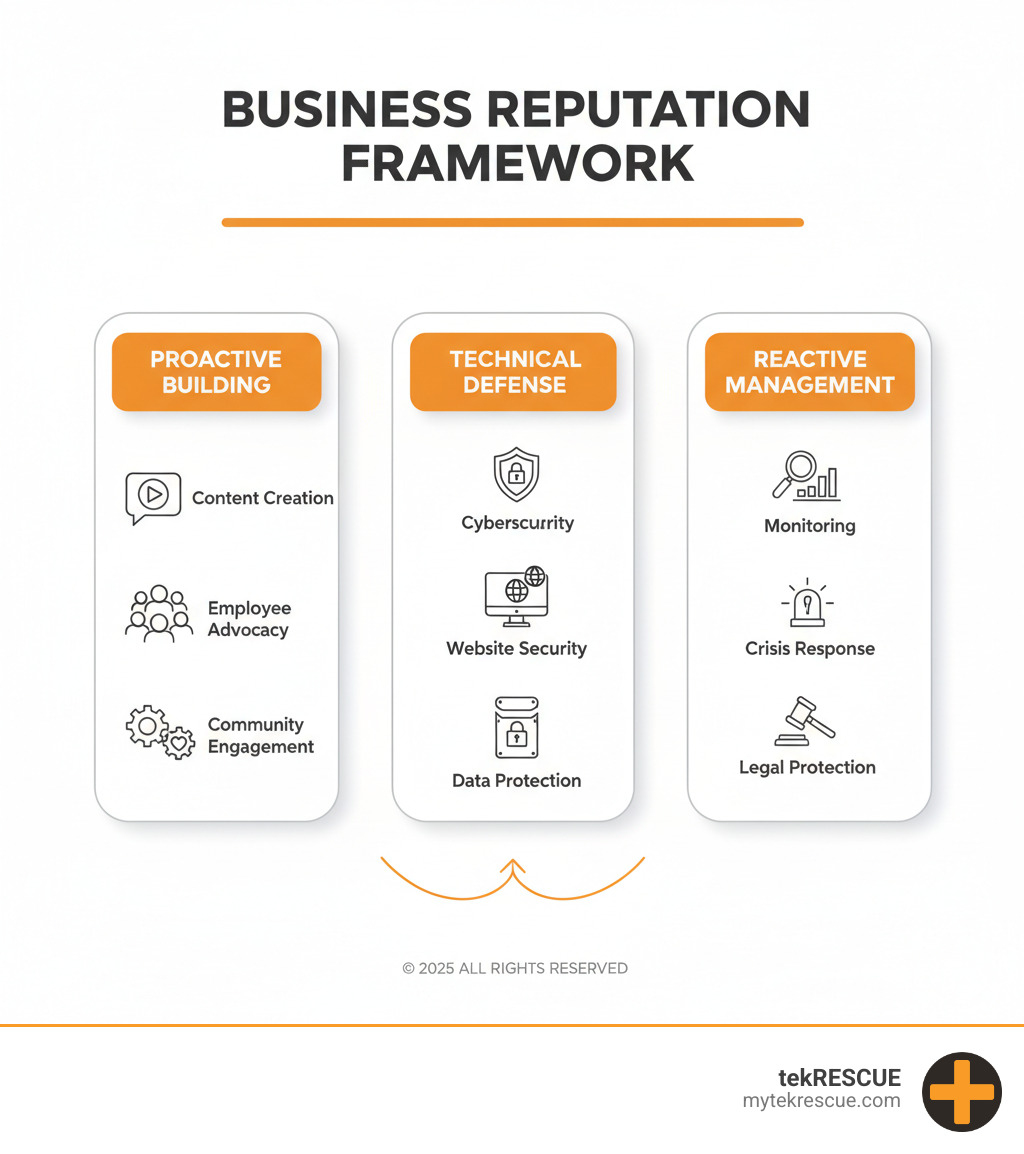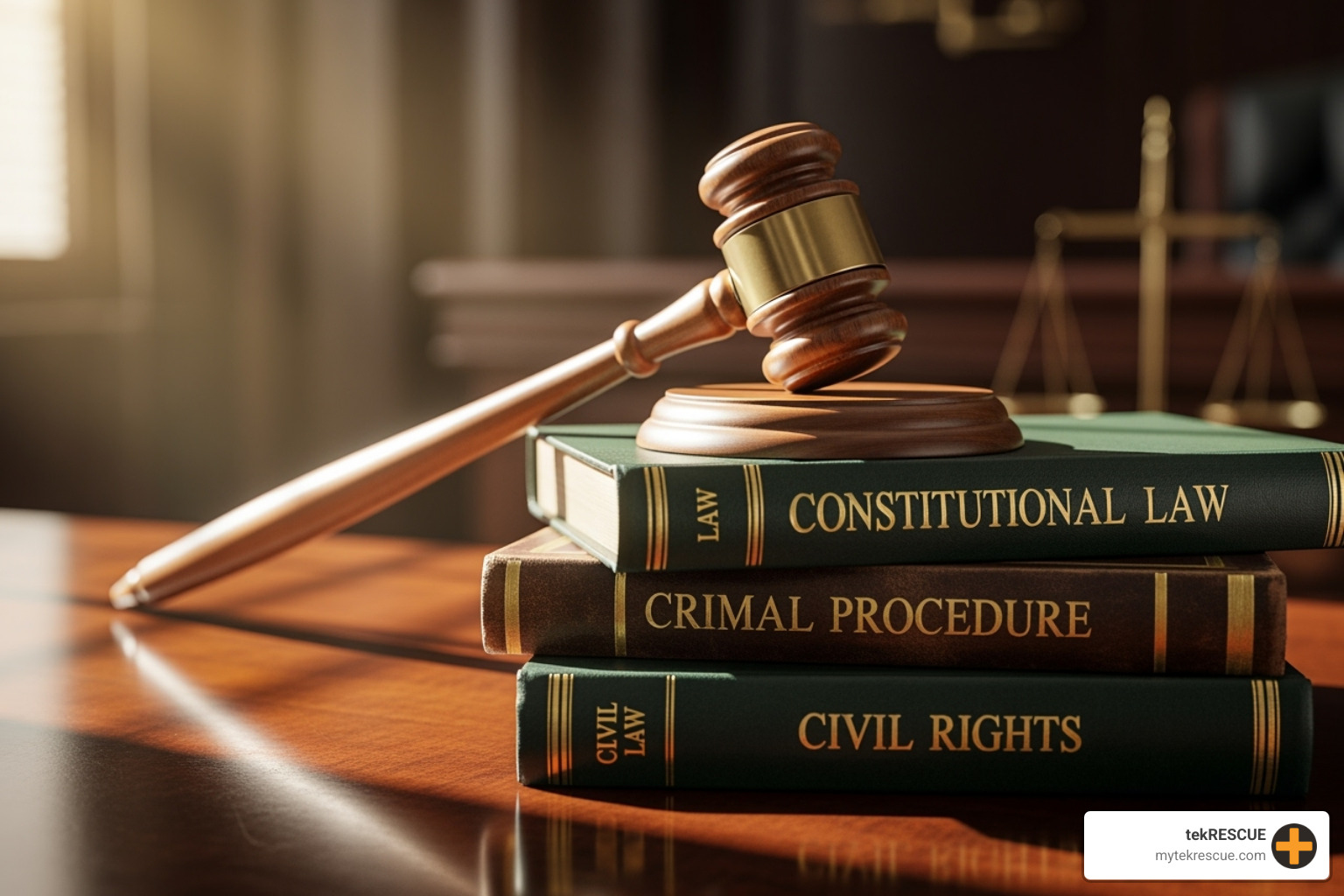

Building Trust: Comprehensive Guide To Protecting Your Brand Reputation
Protecting business reputation is a critical priority for all businesses. In an economy where up to 80% of market value comes from intangible assets like brand equity, your reputation is everything.
Quick Answer: How to Protect Business Reputation
- Build proactively – Create positive content, gather testimonials, and maintain consistent branding
- Monitor actively – Use tools like Google Alerts to track mentions across platforms
- Secure digitally – Implement cybersecurity measures to prevent data breaches
- Respond professionally – Address negative feedback promptly and transparently
- Plan for crisis – Have a crisis management framework ready before you need it
- Know your legal options – Understand defamation laws and when to seek legal help
Warren Buffett said it best: “It takes 20 years to build a reputation and five minutes to ruin it.” This is especially true today, as 88% of consumers rely on online reviews to make purchasing decisions.
The stakes are high. When trust is broken, over 55% of consumers will not return to a brand. A single data breach or viral complaint can erase decades of hard work.
Reputation damage is probable without the right protection. Businesses face threats from fake reviews, disgruntled employees, cyberattacks, and crisis situations.
I’m Randy Bryan, founder of tekRESCUE. For over two decades, helping businesses with integrated cybersecurity and digital strategies, I know what it takes to build a resilient brand.

Table of Contents
A Comprehensive Framework for Protecting Business Reputation
Successful companies don’t just react to problems; they build comprehensive defense systems that make their reputations resilient.
Proactive Reputation Building
The best defense is a good offense. A strong foundation of positive content, happy customers, and community connections makes your business more resilient to negative attacks.
Marketing strategies and branding consistency are the backbone of your reputation. Every touchpoint, from your website to your business cards, must tell a unified story. Mixed messages erode trust.
Customer testimonials and social proof are powerful, influencing 88% of consumers. Don’t just collect them, showcase them strategically for maximum impact. Ask for reviews while the experience is fresh, and make it easy with direct links. A mix of 4- and 5-star reviews appears more authentic and trustworthy than perfect scores alone.
Employee advocacy and positive internal culture create your best brand ambassadors. Happy employees naturally champion your brand, while a toxic culture can quickly damage your reputation. Invest in employee satisfaction and create feedback channels to mitigate risks.
Community engagement and influencer partnerships build crucial goodwill. Supporting local events creates a loyal customer base that stands by you during challenges. Partner with influencers whose values align with your brand for authentic reach, but give them creative freedom.
Cybersecurity’s Role in Protecting Your Reputation
Your cybersecurity posture is directly tied to your reputation. A single data breach can destroy years of trust.
The paramount importance of cybersecurity can’t be overstated. 43% of cyberattacks target small businesses, but only 14% are prepared. The reputational damage from a data breach often outweighs the financial costs, as most customers won’t give you a second chance.
Data breach impact and prevention strategies must be part of your reputation framework. Beyond technical security, employee training is critical, as your staff is the first line of defense. Be transparent about your security measures to build customer confidence and review the FTC’s a guide for businesses on data breach response.
Website security and digital asset protection are also key. Trademarking your brand identity provides legal protection against unauthorized use. Domain protection is equally crucial; register your primary domain and common variations, and set up auto-renewal to prevent it from being lost to squatters.
Active Monitoring and Engagement: Managing Online Conversations
Online conversations about your business are always happening. You can either participate or let others control the narrative.
Social media monitoring and online review management require consistent attention. Incidents like United Airlines’ “United Breaks Guitars” (a 10% stock drop) or the viral Domino’s employee video show the potential for substantial damage. Use tools like Google Alerts for free, real-time monitoring.
Responding to feedback professionally can turn threats into opportunities. When addressing negative reviews, respond promptly and professionally. Acknowledge and empathize with the customer’s experience. Take responsibility when appropriate and offer concrete solutions. For complex issues, move conversations offline. Don’t forget to engage with positive feedback to reinforce loyalty.
Social listening tools and data analytics like Hootsuite Insights or Brandwatch help you track sentiment and spot potential issues before they become crises.
Crisis Management: A Plan for How to Protect Business Reputation Under Fire
Even prepared businesses face crises. A clear, pre-existing crisis management plan is the key to survival.
Developing a crisis management plan is essential. Your plan should include a designated response team with clear roles, pre-approved messaging templates, and strategies for business continuity and stakeholder communication. Tailor messages for different stakeholders while maintaining a consistent core message.
Transparency and accountability build trust during a crisis. Hiding information often causes more damage than admitting mistakes. After a crisis, assess the damage and learn from the experience to improve future responses and build stronger systems.
Understanding Business Defamation: Your Legal Options for Protection
When negative opinions cross into defamation, legal options offer another layer of protection.

Business defamation is a false statement that damages your company’s reputation. Libel is written (e.g., fake reviews), while Slander is spoken.
Proving a defamation claim requires showing the statement was demonstrably false, communicated to a third party, and identified your business. You also need to prove negligence or malice and actual financial damages.
Legal remedies include damages for losses and court orders (injunctions) to stop the spread of false information. Always consult experienced legal counsel for potential defamation cases to assess your claim and gather evidence.
Continuous improvement and long-term strategy are key. Regularly review your strategy and adapt to consumer expectations to keep your reputation resilient. Building trust and loyalty creates a strong foundation; a one-star rating decrease can cut revenue by nearly 10%, according to Harvard Business School research.
Secure Your Legacy: Partner with Experts to Protect Your Reputation
Protecting your business reputation is a full-time job requiring specialized knowledge and resources. Most business owners simply don’t have the time.
That’s why tekRESCUE exists. For over two decades, we’ve helped businesses navigate changing cyber threats, manage online conversations, and protect their growing digital footprints.
A Multi-Faceted Approach That Actually Works
Reputation protection is complex because it’s integrated into everything: your cybersecurity affects trust, digital marketing shapes perception, website design creates first impressions, and Strategic AI Consulting keeps you ahead of threats.
Many businesses use separate vendors, creating security gaps. We provide an integrated approach because your reputation protection shouldn’t be siloed.
Building Foundations, Not Just Fixing Problems
We are proactive. Our managed IT services create a secure and reliable digital foundation. With bulletproof systems, you avoid explaining outages or data breaches to customers.
We are your long-term partner, fortifying your defenses and crafting compelling online narratives. We help you create positive content, manage your digital footprint, and provide expert guidance during a crisis.
Your Reputation, Our Expertise
Think of us as your all-in-one reputation defense team. We combine cybersecurity, digital marketing, and strategic thinking to shield the business you’ve worked so hard to build.
Continuous improvement and long-term strategy are key. Regularly review your strategy and adapt to consumer expectations to keep your reputation resilient. Building trust and loyalty creates a strong foundation; a one-star rating decrease can cut revenue by nearly 10%, according to Harvard Business School research.
Ready to secure your legacy and ensure your business shines online? Learn how our managed IT services can form the bedrock of your reputation protection strategy.
Your reputation is your legacy. Let’s protect it together.
Table of Contents









